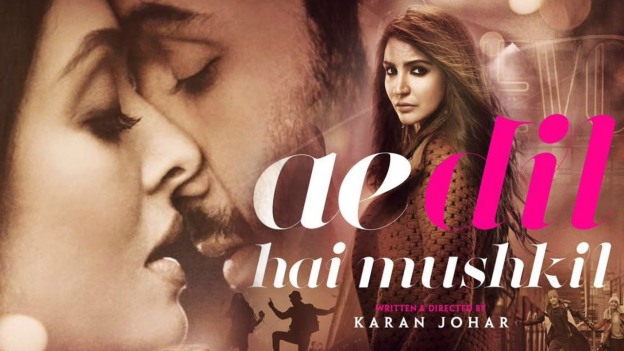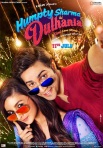The best thing that could have happened to Karan Johar’s latest movie, Ae Dil Hai Mushkil was the controversy surrounding Fawad Khan, the Pakistani actor who makes a blink-and-you’ll-miss-it appearance in this bloated 2 hour 35 minute-long weep fest. Even among Johar loyalists like me who were enthralled by the escapist glossiness of Riverdale romance Kuch Kuch Hota Hai and manipulative melodrama Kabhi Khushi Kabhi Gham, the bloom was wearing off, thanks to clunkers like My Name is Khan and Student of the Year. Without the hype surrounding the movie and a trailer featuring the glorious title song, I wonder how many of us would have dragged ourselves to this throwback of a movie, featuring foreign locations and playback singing, features that have become passé even in formula-driven Bollywood.
Johar sets this tale of unrequited love in his usual upper crust milieu, where transportation is by private jet and the credit cards are bottomless, but it has always been his forte to focus on the emotional anxieties of the rich and famous. If that lends his movies a sheen of inauthenticity, that is usually overcome by the clever lines, the crisp editing, and the attractiveness and chemistry of his lead actors.
In ADHM, though, his charm runs out, and what we are left with is a pastiche of countless movies of the 90s and 00s, including Johar’s own, which have fermented in his gut a tad too long before being regurgitated into a stinky mess that reeks of desperation. Every line of dialogue is either from another movie, or sounds like it should be. Plenty of old classic songs are replayed constantly, as are tunes from old KJ movies. Even the scenes are repurposed. A scene of the actors cavorting in a Swiss-like mountain meadow is obviously a Yash Chopra homage, but feels dreadfully like the director has run out of ideas, especially since the actors begin the scene in Paris.
Even the actors inhabit multiple personalities from their previous movies. Ranbir Kapoor, who is surely a better actor than on display here, senses the fakery of the premise and decides to recycle responsibly. He is Ved from Tamasha for the first half hour or so, before seguing into Barfi and then Janardhan/Jordan from Rockstar. Anushka Sharma looks like Zaara from Veer Zaara and acts like Taani from Rab Ne Bana Di Jodi. Since the two are not even supposed to be in love with each other, even the Shahrukh/Kajol kind of chemistry cannot be relied on to prop up the movie, though the Khan gamely makes a Botoxed-cameo to help out his friend,
Aishwarya Rai, Ranbir’s other love interest, seems to be in this movie to triumphantly prove to her detractors that she is back in shape and drop-dead gorgeous again, so take that, you haters. Every scene is an audition for a future perfume commercial or a jewelry line, with popping lip color and artfully waved hair framing those luscious features. It’s possible she has a no-kissing clause in her movie contracts because her love-making scenes with Ranbir are positively anemic, which are such a disservice to the story, given that their relationship is supposed to be one of sensuous physicality.
The one redeeming factor of KJ’s movies has always been the pleasant sense of satiation one gets from consuming buttered popcorn but, sad to say, it’s time to admit that the butter has gone rancid and the popcorn is soggy. Mainstream Bollywood has been coming out with very interesting movies lately, like Pink, and Badlapur, and Kahaani, where the emphasis is rightly on strong narratives, indigenous themes, and meaty roles. The era of Karan Johar’s fantasies may have finally passed, it seems. I think I’ll miss it, but I’m glad it’s done.

 I blame Farah Khan. After the huge success of Main Hoon Na filmmakers realized that they could just slap a coat of fresh paint on old Bollywood hits, add a tribute scene or two, repackage the tried and tested formula with some contemporary flavor and thrust it on unsuspecting audiences too young to remember the original.
I blame Farah Khan. After the huge success of Main Hoon Na filmmakers realized that they could just slap a coat of fresh paint on old Bollywood hits, add a tribute scene or two, repackage the tried and tested formula with some contemporary flavor and thrust it on unsuspecting audiences too young to remember the original. We have a saying in our family that “Disney Ruins Everything.” We watched in dismay as the quality of Pixar movies dropped after Disney took over, and now the Disneyfication of Marvel has the die-hard comic fans in my family aghast.
We have a saying in our family that “Disney Ruins Everything.” We watched in dismay as the quality of Pixar movies dropped after Disney took over, and now the Disneyfication of Marvel has the die-hard comic fans in my family aghast.
 ost any of Ram Gopal Varma’s oeuvre and you’ll see what I mean. The difference here is that instead of setting the confrontations in Mumbai’s dank and fecund underground, Kashyap takes on the coal belt towns of Dhanbad and Wasseypur and the gory butchering industry to craft a multi-genrational saga that has more than a passing resemblance to the Godfather series in its delineation of characters and their relationships.
ost any of Ram Gopal Varma’s oeuvre and you’ll see what I mean. The difference here is that instead of setting the confrontations in Mumbai’s dank and fecund underground, Kashyap takes on the coal belt towns of Dhanbad and Wasseypur and the gory butchering industry to craft a multi-genrational saga that has more than a passing resemblance to the Godfather series in its delineation of characters and their relationships. Bollywood’s formula has always been to take run-of-the-mill themes and melodramatize the heck out of them – the lovers from different social classes, the son taking revenge on his father’s killer, the love triangle. So when a movie does the exact opposite, taking an outlandish theme and treating it as a normal, everyday phenomenon, it comes as a welcome surprise.
Bollywood’s formula has always been to take run-of-the-mill themes and melodramatize the heck out of them – the lovers from different social classes, the son taking revenge on his father’s killer, the love triangle. So when a movie does the exact opposite, taking an outlandish theme and treating it as a normal, everyday phenomenon, it comes as a welcome surprise. There are so many things to like about Kahaani, not the least of which is the movie’s setting in Calcutta, sorry, Kolkata. Name change notwithstanding, the city seems much the same to someone who left it 20 years ago—claustrophobic but convivial and female-friendly. Director Sujoy Ghosh treats the city and its denizens with familiarity and affection, and I could sense the many Bengali viewers in my local multiplex just settling down in their seats a little more comfortably as the movie rolled on. It is such a pleasure, and a rarity, to watch a Bollywood movie that has no Punjabi characters or North Indian settings.
There are so many things to like about Kahaani, not the least of which is the movie’s setting in Calcutta, sorry, Kolkata. Name change notwithstanding, the city seems much the same to someone who left it 20 years ago—claustrophobic but convivial and female-friendly. Director Sujoy Ghosh treats the city and its denizens with familiarity and affection, and I could sense the many Bengali viewers in my local multiplex just settling down in their seats a little more comfortably as the movie rolled on. It is such a pleasure, and a rarity, to watch a Bollywood movie that has no Punjabi characters or North Indian settings. The ethos of the Mumbai underground is like compost – full of discarded peels and cracked eggshells, ripe-smelling and treacherous underfoot – but rich fodder for the imagination of talented directors. Vishal Bharadwaj is one such wunderkind, and he uses the steaming, stinking pile to fashion yet another cinematic gem.
The ethos of the Mumbai underground is like compost – full of discarded peels and cracked eggshells, ripe-smelling and treacherous underfoot – but rich fodder for the imagination of talented directors. Vishal Bharadwaj is one such wunderkind, and he uses the steaming, stinking pile to fashion yet another cinematic gem. I remember waiting to see Jab We Met on DVD, reasoning that a debut film with a hokey, polyglot title was not worth wasting $9.50 on. Boy, was I wrong. JWM was funny and charming, a crazy train ride through Indian suburbia (albeit a pretty glossy one), so watching Love Aaj Kal on the big screen was a foregone conclusion.
I remember waiting to see Jab We Met on DVD, reasoning that a debut film with a hokey, polyglot title was not worth wasting $9.50 on. Boy, was I wrong. JWM was funny and charming, a crazy train ride through Indian suburbia (albeit a pretty glossy one), so watching Love Aaj Kal on the big screen was a foregone conclusion. “It’s a crime comedy, it’s a thriller,” equivocated Raj Nidimoru, the co-director of 99, refusing to reveal the plot of his first Bollywood movie on a phone conversation a few weeks ago. But what 99 is first is an entertainer, with the plot a loose device to string together a host of funny moments and clever dialogue.
“It’s a crime comedy, it’s a thriller,” equivocated Raj Nidimoru, the co-director of 99, refusing to reveal the plot of his first Bollywood movie on a phone conversation a few weeks ago. But what 99 is first is an entertainer, with the plot a loose device to string together a host of funny moments and clever dialogue.